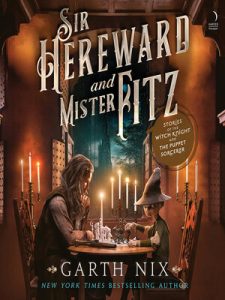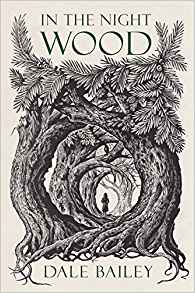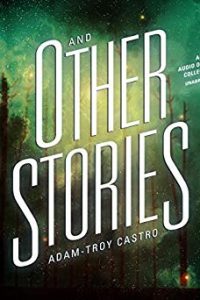Gary K. Wolfe Reviews Sir Hereward and Mister Fitz by Garth Nix
 Sir Hereward and Mister Fitz, Garth Nix (Harper Voyager 978-0-06329-196-6, $30.00, 304pp, hc) August 2023.
Sir Hereward and Mister Fitz, Garth Nix (Harper Voyager 978-0-06329-196-6, $30.00, 304pp, hc) August 2023.
Although writers as diverse as Joanna Russ and Terry Pratchett have paid tribute to Fritz Leiber’s classic Fafhrd and the Gray Mouser stories, arguably the most prominent current descendants of these tales are the Darger and Surplus stories of Michael Swanwick and the Hereward and Fitz stories of Garth Nix, now collected for the first time in Sir Hereward and Mister Fitz. Leiber is widely credited with introducing a much-needed dimension of irony and characterization into the blustery sword-and-sorcery epics of Robert E. Howard and others, and while this more humanistic approach is much in evidence in both Swanwick and Nix, they otherwise take the tradition in very different directions. (Nor is any familiarity with the tradition at all necessary to enjoy these stories.) For one thing, Nix’s heroes are neither outlaws nor barbarians, but rather certified agents of the Council of the Treaty for the Safety of the World, a kind of NATO for exorcisms authorized by various empires, kingdoms, and republics. Their assignment is to ferret out and banish or destroy various malign ‘‘godlets’’ that may threaten the stability of the apparently late-medieval world order. (Part of the game, of course, is sussing out the nature of the setting; one story mentions that printing had been developed a century earlier, which would suggest the mid 16th century, while another hints there may be multiple moons, yanking it out of our history altogether. And Nix delights in concocting compound proper names like Xavva-Tish-Laqishtax, which befuddle any effort at finding linguistic clues.)
Sir Hereward is a skilled swordsman and artillerist who sometimes pretends to be a roguish mercenary for hire, but he’s actually the only male heir of an ancient family called the Witches of Tar, and on occasion is plagued by his nagging aunts. Mister Fitz is something else entirely, an apparently fragile puppet with a papier-mâché head, but who centuries earlier was ensorcelled with all sorts of protections, and is who now a skilled sorcerer himself. (He also occasionally switches gender or abandons it entirely; when he served as Hereward’s childhood nanny, he was Mistress Fitz.) We first meet them in ‘‘Sir Hereward and Mister Fitz Go to War Again’’, the earliest of the nine stories collected here, in which they travel through a bleak wasteland until they come upon the lush and wealthy city of Shûme – whose prosperity, it turns out, depends on the local godlet’s predation on all the surrounding territory; the stronger the godlet gets, the more the world will be laid waste. That sort of environmental theme will crop up again in these stories, but it never weighs down the rapid-fire adventure, which in this case includes Hereward’s near-romance with an attractive temple guard named Jessaye.
Sword and sorcery has often involved a fair amount of horror, such as a gigantic starfish-monster in ‘‘Beyond the Sea Gate of the Scholar-Pirates of Sarsköe’’, the demon who takes the shape of an innocent young nun in ‘‘A Suitable Present for a Sorcerous Puppet’’, or – most effectively – the terrifying Hag of the Shallows, which threatens a fortified convent in ‘‘Home is the Haunter’’, one of the most skillfully plotted tales here, as Fitz’s suspicions about the true nature of the convent play out like a mystery. ‘‘A Cargo of Ivories’’, on the other hand, is a sweet-tempered heist tale, in which the pair find themselves in an alliance with an attractive thief named Tira, one of a number of such women who seem to distract Hereward on a regular basis. Their encounter with a shapeshifting dragon in ‘‘Cut Me Another Quill, Mister Fitz’’ is another story with a delightful comic edge. The most unusual story in terms of point of view is ‘‘Losing her Divinity’’, which deals with a pair of twin goddesses but is narrated in first person by a rather roguish figure trying to defend himself to Hereward and Fitz.
And the one new story here – the others date from 2007 to 2020 – is ‘‘The Field of Fallen Foe’’, in which Hereward must decide whether to obey an apparently unfair assassination order from one of his aunts – while, of course, flirting with an attractive sorceress along the way. While the individual episodes of Sir Hereward and Mister Fitz are often hilarious, and sometimes scary, tales in their own right, having them together adds to the fun, as we’re invited to piece together their backstories and their world in a way that can be far more exhilarating than working our way through great mounds of worldbuilding. Most important, though, is that these are figures – sometimes petulant, sometimes arrogant, sometimes dead wrong, and sometimes frankly heroic – that we’re lucky to hang out with, and who always leave us wanting the next adventure.
Gary K. Wolfe is Emeritus Professor of Humanities at Roosevelt University and a reviewer for Locus magazine since 1991. His reviews have been collected in Soundings (BSFA Award 2006; Hugo nominee), Bearings (Hugo nominee 2011), and Sightings (2011), and his Evaporating Genres: Essays on Fantastic Literature (Wesleyan) received the Locus Award in 2012. Earlier books include The Known and the Unknown: The Iconography of Science Fiction (Eaton Award, 1981), Harlan Ellison: The Edge of Forever (with Ellen Weil, 2002), and David Lindsay (1982). For the Library of America, he edited American Science Fiction: Nine Classic Novels of the 1950s in 2012, with a similar set for the 1960s forthcoming. He has received the Pilgrim Award from the Science Fiction Research Association, the Distinguished Scholarship Award from the International Association for the Fantastic in the Arts, and a Special World Fantasy Award for criticism. His 24-lecture series How Great Science Fiction Works appeared from The Great Courses in 2016. He has received six Hugo nominations, two for his reviews collections and four for The Coode Street Podcast, which he has co-hosted with Jonathan Strahan for more than 300 episodes. He lives in Chicago.
This review and more like it in the September 2023 issue of Locus.
 While you are here, please take a moment to support Locus with a one-time or recurring donation. We rely on reader donations to keep the magazine and site going, and would like to keep the site paywall free, but WE NEED YOUR FINANCIAL SUPPORT to continue quality coverage of the science fiction and fantasy field.
While you are here, please take a moment to support Locus with a one-time or recurring donation. We rely on reader donations to keep the magazine and site going, and would like to keep the site paywall free, but WE NEED YOUR FINANCIAL SUPPORT to continue quality coverage of the science fiction and fantasy field.
©Locus Magazine. Copyrighted material may not be republished without permission of LSFF.






